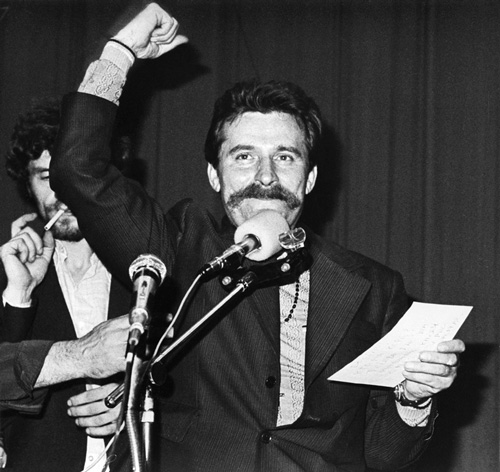
On Thursday, August 14, 1980, Lech Walesa led his fellow workers in Gdansk, Poland, seizing the Lenin Shipyard, demanding wage increases and the right to organize a union.
In their “crowded hour,” their “moment of truth,” Walesa and his compatriots embarked on an uncharted path that would end in altering the currents of history.
Inevitable? Only in Retrospect
Looking back, some if not many people assume that the collapse of the Soviet Empire was preordained.
Perhaps in some sense It was preordained. We cannot know. We do know that the courageous actions of a handful of people were decisive in energizing the necessary involvement of the greater populace in various ways, in various nations in the tumult of the 1980s.
It can be useful to consider the situation from the vantage point of what one knew in Gdansk in the summer of 1980.
The new Pope John Paul II had visited his Polish homeland in 1979, but, as of yet, Stalin’s rancid jibe from the Second World War still rang true: How many divisions has the Pope? The Soviet Union had intervened with necessary power to maintain its Central European buffer states, including with conspicuous force in Hungary in 1956 and Czechoslovakia in 1968. This remained a high risk in 1980, when the USSR was on the offensive, directly and indirectly, from Afghanistan to Africa to Central America.
These risks doubtless weighed heavily on the citizens of Gdansk, who had experienced tragedy repeatedly in recent memory.
There was, as yet, no President Reagan. Indeed, even one who took Reagan at his word in 1980, seeking to hasten the decline of Soviet Union, could not be at all certain that the former Hollywood actor possessed the skills, commitment or vision that would be required.
One Day that Changed Course of History
Walesa and his fellow workers took a fateful step, going all-in into the course of fast-moving currents of history. They might well have envisioned the worst-case scenario. The best-case may have been more difficult to conjure with confidence.
They could look for some inspiration to successful mass movements such as the American civil rights struggle. And yet, they could only be reassured so far. Unlike the United States, the Soviet Union did not allow free expression to develop much less flourish or be reflected at the ballot box.
There was no exact or near precedent for a successful fundamental challenge from a satellite country, surely not one which emanated from workers, challenging the fundamental assumptions of Marxist-Leninist ideology. This was exacerbated by its occurrence in Poland, with a long history of troubled relations with Russia.
Your Moment of Truth
Would you be prepared for your moment of truth?
Would you recognize its arrival? History does not tend to present itself clearly in prospect.
Have you done the hard work of forethought and planning for the unforeseen moment when your deepest values are put to the test?
Whether it’s in a darkened theater at midnight in Aurora, Colorado, or in a grimy shipyard in Gdansk–or in a corporate meeting with your managers or a conference call with stakeholders–will you be prepared when your crowded hour presents itself?
It may well come without warning, out of context, too important to process at once or camouflaged in something so mundane that you might easily overlook it.
In the photo of Walesa above, would you be in the front–or watching, waiting from behind?
How are you preparing?
Lech Walesa | Day that Changed Course of History
